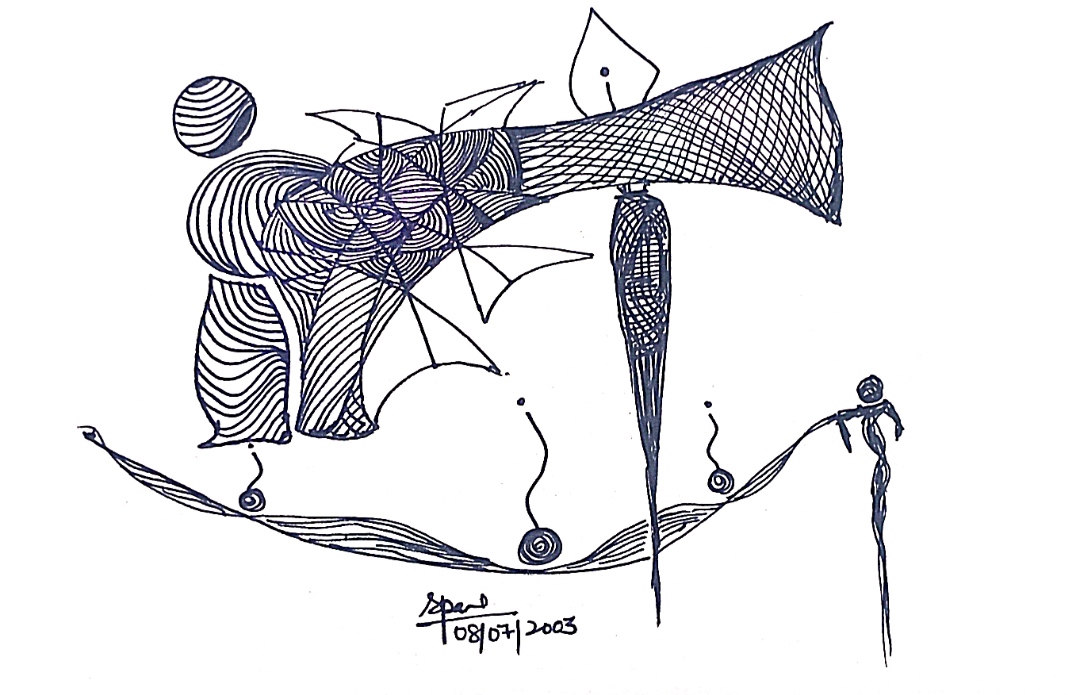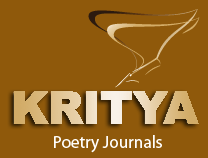
Our Masters

Soso Tham’s
( From the first poetry collection Ka Duitara Ksiar)
Pearls
Dew drops on the grass,
In the morning they glitter;
I too from home will depart
To hunt for these pearls.
From the grass that is green
They take off with the sun;
Like them then I’ll plunge
To an unknown region.
The thorns though they prick
In a faraway street;
From home I’ll depart
And return long after.
The heart too will grieve
Alone faraway;
The tears that gather
Are actually pearls.
Translated by Kynpham Sing Nongkynrih
Stars
Look young men what lies ahead,
That you may tell which way to step;
There’s a star that leads the way,
Alive the name the glory stays.
Make an effort like other men,
Work not only for your subsistence;
But also that you may ascend,
From the very rungs of fame.
Or to pile up only wealth,
And your boundaries to spread;
Because long they can’t remain,
Like reputation and a name.
Though you maybe small and weak,
Quietly if you have to weep;
Who will say you cannot claim,
Glory and a name.
Fear not if you have to plod,
Through the fire or through blood;
Only brave men who are game,
May reach the mountaintops of fame.
Though the sun beats down on you,
Soon the cool breeze you’ll taste too;
It’s in all that’s done diligently,
That it lurks immortal glory.
Translated by Kynpham Sing Nongkynrih
The Green Grass
Quietly in the wood,
It grows among the weeds;
An uncommon blossom, u tiew dohmaw, *
A thing of lofty thoughts.
Quietly by shadowy streams,
To be a fragrance when faded,
The joy-giving fern
Remains green for twelve moons.
Tell me twilight, beloved of the gods,
And you the motley clouds;
Tell me where is that star
That first speckles the sky.
Quietly he lives, quietly he dies,
Amidst the wilderness;
Quietly in the grave let him rest,
Beneath the green, green grass.
*A wild flower, symbol of great wisdom.
Translated by Kynpham Sing Nongkynrih
The Pine Tree
The sun beats down on me,
The wind lashes at me;
To the sky the branches spread
Through the earth the roots thread.
Alone I am the forest,
Though all alone I rise;
The thoughts are lofty,
That swirl inside me.
That every man is wise,
That who can deny;
Yet without a break,
How can he even speak.
Of a sudden a branch snaps,
All the town shivers;
It is only a paragon,
Who wins the love of all.
It is only in a paragon,
That lies the will that lasts;
You may fault him all you can,
But how will you root him out.
Like him I too must go,
Like a man mightily must I fall;
Look, children of the earth,
Like this I’m standing tall.
Translated by Kynpham Sing Nongkynrih
The Days that Are Gone
I will go to ri 1 Sohra to be among the hills,
The land of u tiew sohkhah and u tiew pawang lum; 2
The land of ka sim pieng, the land of u kaitor, 3
The land of valour, the land of culture.
Listen, in ri Sohra, that ïewbah 4 has arrived,
It resonates the cheering that the archery may be won!
It sinks into the caverns, from the sky too it creeps,
To a Khasi, a Pnar, a Bhoi, or a War. 5
Its cliff-edges too overflow without end,
With the torrent that roars, the breeze that’s tender;
And the heart that’s forever youthful hums in the woods,
Thus rumble the gorges of ri War and reverberate the boulders.
Long have I departed from relations and friends,
Though others have gone, others linger on;
Thus the honour of Sohra and its silver seas,
Once more, once more, came dazzling to me.
Thus the days that are gone, they surge and they surge,
I don’t know the beginning or where they would end;
Only this I do know, that often I do want—
Once more, once more to be a child.
1 Country. 2 Orchids. 3 Songbirds. 4 Big market day. 5 Names of the sub-tribes of the Khasis.
Translated by Kynpham Sing Nongkynrih
Soso Tham  (Meghalaya)born to a very poor family in the year 1873 from Cherrapunjee, He was the third and only son in a family of four children. Due to acute poverty after his father’s death he had to discontinue his studies after eighth standard. Despite his little formal education he rose up to a level of a high school teacher and excelled in his teaching career.
(Meghalaya)born to a very poor family in the year 1873 from Cherrapunjee, He was the third and only son in a family of four children. Due to acute poverty after his father’s death he had to discontinue his studies after eighth standard. Despite his little formal education he rose up to a level of a high school teacher and excelled in his teaching career.
He later became the first poet to initiate secular literature with diction, both singular and genuine. He was also the first person to make use of Khasi idioms in a form taken mainly from English poetry. He is basically remembered for his beautiful poems. His “Ka Duitara Kshiar” (The Golden Harp, 1925) – a compilation of poems, is one of the most distinguished works. Today, his poems are being included in the academic curriculum in the state and some of his greatest works have been translated into English by scholars from Meghalaya. he died on December 18, 1940.

